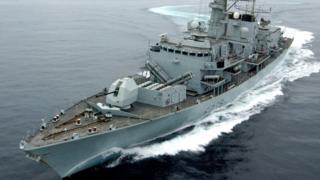Jeremy Hunt pledges to reverse cuts to Navy amid Iran row
 Image copyright Reuters
Image copyright Reuters Jeremy Hunt has promised to reverse cuts to the size of the Royal Navy if he becomes prime minister.
It comes after the Ministry of Defence said Iranian boats tried to impede a British oil tanker in the Gulf – before being driven off by a Royal Navy ship.
Writing in the Telegraph, Mr Hunt said events in the Gulf showed the navy needed more warships.
The Tory leadership hopeful has already pledged to boost defence spending by £15bn over the next five years.
The foreign secretary said the Royal Navy had been “run down” over recent decades and he would review the size of the current fleet of 19 frigates and destroyers.
Mr Hunt’s leadership rival, Boris Johnson, has also committed to increasing the UK’s defence budget, but BBC defence correspondent Jonathan Beale said his plans appeared more modest.
The pair will face one-on-one interviews with Andrew Neil later, which will be broadcast on BBC One at 19:00 BST.
Mr Hunt said there was “incredible menace” behind Iran’s actions in the Gulf.
On Tuesday, the UK raised the threat to British shipping in Iranian waters in the Gulf to the highest level – where the risk of attack is critical.
The following day, boats believed to belong to Iran’s Islamic Revolution Guard Corps (IRGC) approached the British Heritage tanker and tried to bring it to a halt as it was moving out of the Gulf into the Strait of Hormuz.
HMS Montrose, a British frigate shadowing the BP-owned tanker, was forced to move between the three boats and the ship, a Ministry of Defence spokesman said.
HMS Montrose is currently the only frigate in the Gulf providing protection to British merchant shipping, amid growing tensions in the region.
The relationship between the UK and Iran has become increasingly strained after Britain said the Iranian regime was “almost certainly” responsible for attacks on two oil tankers in June.
Tensions escalated again last week after British Royal Marines helped the authorities in Gibraltar seize an Iranian tanker because of evidence which suggested it was carrying oil to Syria, in breach of EU sanctions.
Iran claimed the tanker, Grace 1, was not bound for Syria and called for it to be released. An Iranian official said a British oil tanker should be seized in retaliation, if Grace 1 was not released.
Iran later summoned the British ambassador in Tehran to complain about what it said was a “form of piracy”. His comments were dismissed as “nonsense” by the UK Foreign Office.
The ongoing imprisonment of Nazanin Zaghari-Ratcliffe is also a long-standing bone of contention between the two countries.
The UK continues to press Iran to release the British-Iranian mother who was jailed for five years in 2016 after being convicted for spying, which she denies.
Mr Hunt said investment in defence was needed in the face of new threats, such as cyber-attacks, and “to send a strong signal about Britain’s role in the world” as it left the European Union.
Increasing defence spending would also “keep the Atlantic alliance strong” by demonstrating to the US that the UK is “stepping up to its commitments on defence”, he added.
He said he also wanted to see more fast jets on Britain’s two new aircraft carriers, which he described as “a vital tool for projecting power”.
The UK is one of the few European members of Nato to reach the current target for defence spending of 2% of GDP – but Mr Hunt has pledged to boost this to 2.5% by 2023-24 if he becomes prime minister.
It comes amid growing tensions between the US and Iran, after the Trump administration pulled out of an international agreement on Tehran’s nuclear programme and reinforced punishing sanctions against Iran.




